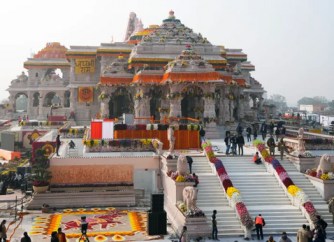From fear to hope: On Ram temple consecration
The Ram temple must help in healing wounds and creating harmony
The opening of the Ram temple in Ayodhya is a sharp turn in the course of the nation. The central role of the state in the rituals associated with the inauguration of the temple is being celebrated by the proponents of the temple, while its opponents fear it is the beginning of a dangerous slide . Two divergent visions of Indian nationhood inspire the two sides. The inauguration of the temple marks a definitive milestone , if not a comprehensive victory, for the vision of the BJP and Prime Minister Narendra Modi. Mr. Modi said it was the beginning of a new era in the history of the country, an era that will last for centuries. He called for humility alongside the celebration of victory and invoked the universality of the spirit of Ram that encompasses all of humanity. Portraying the temple as a link between India’s rich cultural inheritance and ambitions for the future, across the various regions and communities of the country, Mr. Modi exhorted fellow citizens to think big and work purposefully for progress. Ram Rajya has had multiple imaginings. The temple in Ayodhya must inspire and promote the conception of a polity determined not by an obsession with the past, but by an appreciation of the difficulties of the present, and the challenges and opportunities of the future.
The Prime Minister also noted the fact that the temple was facilitated by a judicial decision. The Supreme Court verdict that handed over the disputed land in Ayodhya to the Hindu petitioners had also unambiguously noted that the demolition of Babri Masjid on December 6, 1992, by kar sevaks was a “serious violation of law”. Devotees of the temple, in their moment of celebration, should not be unmindful of the past. Triumphalism and grievance must give way to reconciliation and harmony; and fear must yield to hope. The temptation to use the same template of settling contests over places of worship must be abandoned immediately. Seeking to settle historical grievances can trigger unpredictable social forces and risk national unity. Mr. Modi himself noted this fact while appreciating the relative ease with which the temple was built after the Supreme Court verdict in 2019. In the making of present-day politics, the past is often used as malleable material. It can surely be deployed for the purpose of forging unity and creating harmony, instead of for accentuating differences . The wisdom of statecraft is in making the right choice.
